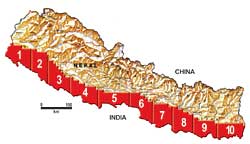 Environmental groups are worried Nepal's achievements in conservation of tarai national parks and the rescue of the tiger and rhino from the verge of extinction will be jeopardised by habitat destruction caused by oil exploration in the region.
Environmental groups are worried Nepal's achievements in conservation of tarai national parks and the rescue of the tiger and rhino from the verge of extinction will be jeopardised by habitat destruction caused by oil exploration in the region. Within a month of coming to power, the Deuba government allowed the British group, Cairn Energy to explore for oil in the tarai under the Petroleum Exploration Project. The Department of Mines and Geology is expected to sign an agreement soon. (See also: 'Tarai crude' #182)
The World Wide Fund for Nature (WWF) is worried that the planned exploration in the Chure hills and in the tarai of central and western Nepal will set back its plans for a cross-border Tarai Arc Landscape Project to link national parks in Nepal and India through protected jungle corridors.
"At this stage, WWF in Nepal has not been informed about the company's plans to look for oil and gas there, and it is vital that any oil exploration in such a delicate environment is undertaken in partnership with WWF, local communities and other stakeholders," the Nepal office of WWF stated.
But going past experience elsewhere in the world, WWF thinks it could have a devastating impact on the environment without appropriate impact assessments. "Before any further steps are taken, Cairn must undertake a strategic environmental assessment (SEA), which allows the public, in particular the people of Nepal, and conservation organisations like WWF, to clearly see what that impact may be."
Officials of Cairn Energy were in Kathmandu recently to pay a courtesy call on the government and thank it for the exploration permission. The company is involved in exploration in India and Bangladesh as well. Officials at the Department of Mines and Geology told us Cairn Energy plans to invest $60 million during exploration in the next few years and would pay $250,000 as royalty to the government every year.
The government is happy about Cairn Energy's interest because no international company had responded to its tender calls for petroleum exploration in recent years. The American firm, Texana, had been prospecting near Nepalganj since 1998, but left after the government declared a state of emergency two years ago. The first exploration permission was given to a French company in 1979, but it didn't find enough deposits to merit extraction.


